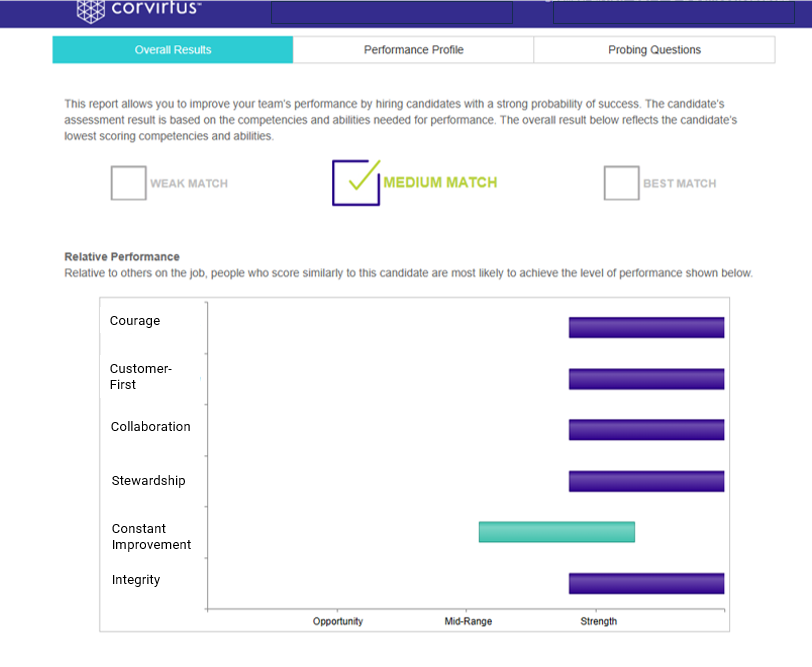For hiring managers and recruiters, there are few things more frustrating than finding a red flag for a candidate regrettably late in the hiring process. Learn how strategically placed assessment tools during recruitment pinpoint and eliminate problematic candidates before they join your team.
Cover Photo by Girl with red hat on Unsplash.
The Importance of Identifying Red Flags Early in Recruitment
Spotting red flags early in the hiring process is key for frustration-free, efficient, and results-driving recruitment. By uncovering red flags early we support a better candidate and hiring manager experience. Some flags are more universal like lacking integrity, interpersonal skills, or the ability to work with others. Others may be job or culture-specific: think about connection with your culture, leadership potential, or the ability to meet core job demands (like work hours, meeting the demands of busy seasons, and working within your systems and constraints). In either case, they can lead to some pretty costly hiring mistakes.
Turnover, even for frontline roles, clocks in at around a third of an employee's annual salary, at minimum. Such errors damage retention, engagement, and the strength of your culture while having a ripple effect on productivity and the overall health of the organization in the process. When hiring misses the mark it hurts the company's top line, bottom line, and everything in between.
To steer clear of these potential pitfalls, assessment, in all of its forms, is key. These tools guide hiring managers in evaluating candidates more thoroughly and objectively, giving a well-rounded view of each applicant's fit for the role. This proactive approach includes using a mix of methods grounded in the competencies that support job performance and your culture:
- Realistic Job Previews. Educate and engage candidates with questions and scenarios foundational to the job, its requirements, and your culture. Candidates receive real-time feedback on how their preferences (for the role or how they would handle a challenge) match or differ from what you're seeking. This early heads-up alerts them to potential challenges or drawbacks. While a few self-select out they leave with greater trust and a stronger impression of your enterprise. Most, however, stick around, but this early intensely helpful heads-up prepares them for what's ahead.
- Hiring Assessments. Pre-employment testing, when validated and grounded in your competencies and psychometrics, assesses the candidate's potential for traits and abilities linked to performance. With Corvirtus assessments this information can guide structured interviewing and support the success of new hires early in their tenure.
- Structured Interviewing. Interviews are the heart of the hiring process, but also the most time intensive. Our goal is to find all red flags before you reach the interview stage. That prepares you to verify what was learned through assessments, the application, and other steps of the process in the interview with greater confidence. We use the term structured intentionally as it's a systematic approach to interviewing, ensuring consistency and fairness in evaluating candidates. By using a predetermined set of questions, interviewers can objectively assess each candidate's qualifications, skills, and fit for the role. This method reduces bias and enhances the reliability of the hiring process, as all candidates are evaluated based on the same criteria. Structured interviews often include behavioral and situational questions, which provide insights into how candidates have handled past situations or might handle future challenges.
Our objective is to uncover red flags as early as possible, increasing savings for both the organization and the candidate.
 By using a multi-step and intentional approach to hiring we can minimize those frustrating moments, for both hiring managers and recruiters as well as candidates. It's about preventing those painful moments when we all realize we've all invested a meaningful amount in the pursuit of something that was never going to happen. With that said, let's talk through some of the most pernicious red flags in hiring and how assessment tools, followed by structured interviewing, in the recruiting and hiring process can support everyone's success.
By using a multi-step and intentional approach to hiring we can minimize those frustrating moments, for both hiring managers and recruiters as well as candidates. It's about preventing those painful moments when we all realize we've all invested a meaningful amount in the pursuit of something that was never going to happen. With that said, let's talk through some of the most pernicious red flags in hiring and how assessment tools, followed by structured interviewing, in the recruiting and hiring process can support everyone's success.
How Assessment Tools Can Uncover Dishonesty
When it comes to hiring dishonesty is like an ever-present shadow and for good reason. A whopping 63% of hiring managers see it as the ultimate red flag.
Sometimes dishonest behavior is clear, like when someone claims to have a job title they never held. Other times, like a shadow, it's harder to discern, like when a candidate presents themselves in a way that feels a bit off or not quite genuine or appears to inflate their experience and qualifications.
Assessment tools are designed to cross-verify information and prompt candidates to provide consistent and truthful answers. By finding dishonesty early, recruiters can avoid hiring individuals who may engage in unethical behavior within the organization. Corvirtus tools often ask the candidate to share how they would expect people who worked with them in the past to describe their contributions.
Assessment tools in recruiting also support integrity by ensuring candidates have the innate abilities and values needed to contribute and flourish. When bringing people on board who lack those qualities they are more likely to struggle with burnout and stress and step into unethical behavior. Therefore, simply using assessments and screening tools in recruitment can support new hire integrity.
Evaluating Interpersonal Skills and Emotional Intelligence
In 2024, and the years that follow, tackling the gap in soft skills (that maybe aren't so 'soft') will continue to remain an area focus for talent acquisition, succession planning, and learning and development. These skills support managing and understanding others and our own feelings which is key to building strong, trusting relationships at work. At its core, emotional intelligence is accurately diagnosing our own emotions, and those of others, and adapting our own behavior and how others perceive us to achieve the intended goal.
Tools like behavioral interviews, situational judgment tests, and personality assessments provide an understanding of how a candidate approaches building and nurturing relationships. Assessments are tailored to the role. Interpersonal skills, and managing emotional labor, for frontline sales will look different than interpersonal skills for restaurant servers or director-level leadership. Corvirtus assessments, for example, can highlight strengths and areas of vulnerability within interpersonal communication and relationship building. An introverted candidate may excel at empathy while an extrovert may struggle with sustaining positivity and resilience. Assessments equip you with this information and understanding of the person before you begin to interview.
By using these assessment tools before interviewing, hiring managers can get a good sense of how candidates handle stress, solve conflicts, and show empathy in tough situations. For example, behavioral interviews might ask about past experiences where candidates had to deal with tricky interpersonal situations, while situational judgment tests can mimic potential workplace challenges to see how a candidate would react. Personality assessments can uncover traits that affect how a candidate might get along with colleagues which are further explored in the structured interview. This thorough evaluation process makes sure that new hires not only have the technical skills needed for the job but also strengthen their culture. They'll be ready to collaborate with teammates, creating a dynamic workforce grounded in mutual respect and cooperation in support of your mission and vision.

Photo by Mina Rad on Unsplash.
Spotting Negativity: Candidates Who Criticize
Locus of control is a construct psychologists like to throw around to refer to the degree people believe they have control over the events in their lives. When we have internal locus of control, we're confident we can influence most of what happens to us. When we start to notice a trend of a candidate believing their circumstances derailed their success, across a number of situations, we start to question whether it's worth the risk of moving forward. Plus, if negativity is a trend for a candidate, they might bring that into your team, creating a contagion effect where their pessimism spreads to others.
Open criticism of past employers and colleagues, and an overriding tone of negativity raise a flag for most of us when hiring. How can we screen candidates who embrace ownership of their circumstances and bring positivity to even a tough situation?
This kind of behavior might suggest there are underlying issues that could impact how well they fit into a new team. It might show a lack of professionalism or hint that they might struggle with handling workplace challenges in a mature and constructive way.
Assessment tools in the recruiting process can place candidates in real situations and screen for their propensity to take a positive and constructive, as opposed to a negative and blaming approach to problem-solving. Corvirtus assessments also ask candidates to share how they expect people will perceive them in six months if they are hired, and how those who worked with them in the past would describe them. This approach increases the validity of candidate responses allowing us to evaluate trends towards pessimism and negativity.

Structured interviews with specific questions about past experiences can also be really useful. These interviews can explore how candidates dealt with conflicts or challenges in previous jobs, showing their approach to problem-solving and their ability to persist with positivity under pressure. By looking out for negativity through these methods, hiring managers can make sure they bring in people who not only have the right skills but also a positive and constructive approach to team members and customers. This thoughtful selection process helps build a team that's not only skilled but also friendly and supportive, creating a culture that glows.
Evaluating Passion, Preparation, and Knowledge
When candidates show real passion and preparation, it's a great sign of their potential to succeed. It shows they're not just interested in the job but are also eager to excel within the company. When someone is genuinely enthusiastic, it often means they have a strong work ethic and are ready to do whatever it takes and bring others along with them. Validated assessment tools like job simulations, work samples, and knowledge tests highlight strengths and potential vulnerabilities in these areas. Situational assessments, for example, let candidates dive into tasks that mimic real-life situations they might face in the role, giving a peek into their problem-solving skills and how they tackle job-specific challenges. Work samples are a great way to see a candidate's skills and creativity in action, showing how they can produce quality work that matches the company's standards. In addition, knowledge tests check out a candidate's grasp of the industry, the company, and the role itself, making sure they have a solid base to build on.
Integrating validated assessment tools throughout your recruiting, and promotion, process supports hiring managers in building teams that will perform and elevate your mission, support and strengthen your values, and stay long-term. By beginning with a clear understanding of job requirements and competencies you can select validated recruiting and selection tools that achieve your intended outcomes.
This proactive approach ensures that new employees are ready and motivated to contribute to the company's success from day one, fostering a sense of ownership and dedication that can drive innovation and your mission. By choosing individuals who show both passion and preparation, you also provide the opportunity for people to work in an environment that supports their sense of purpose, belonging, and overall well-being.




